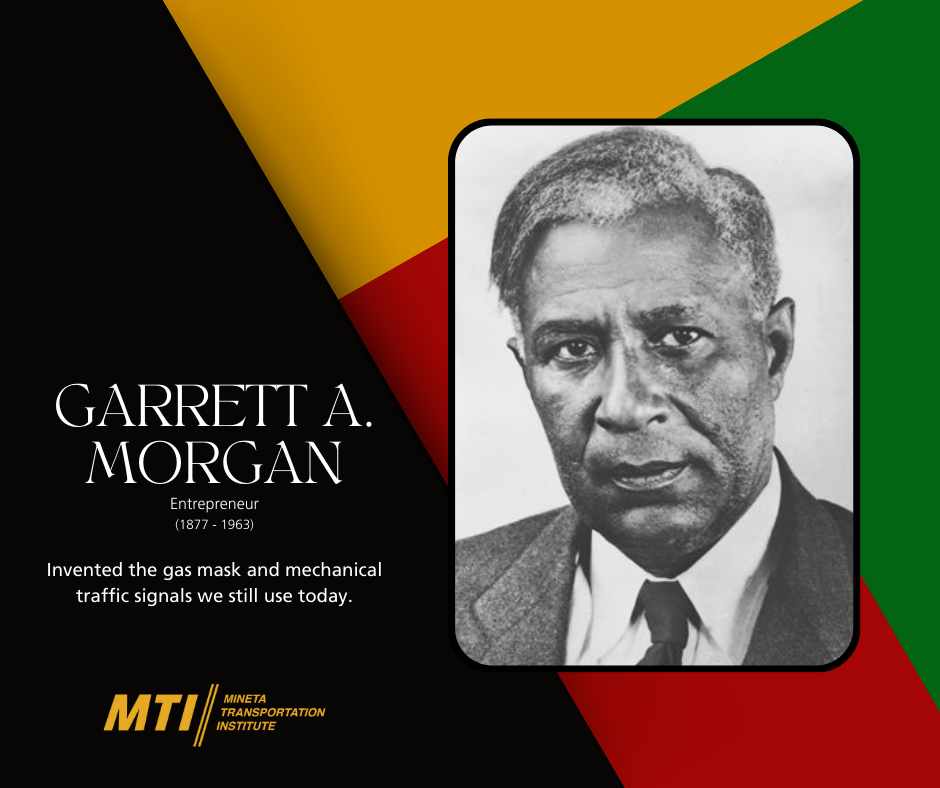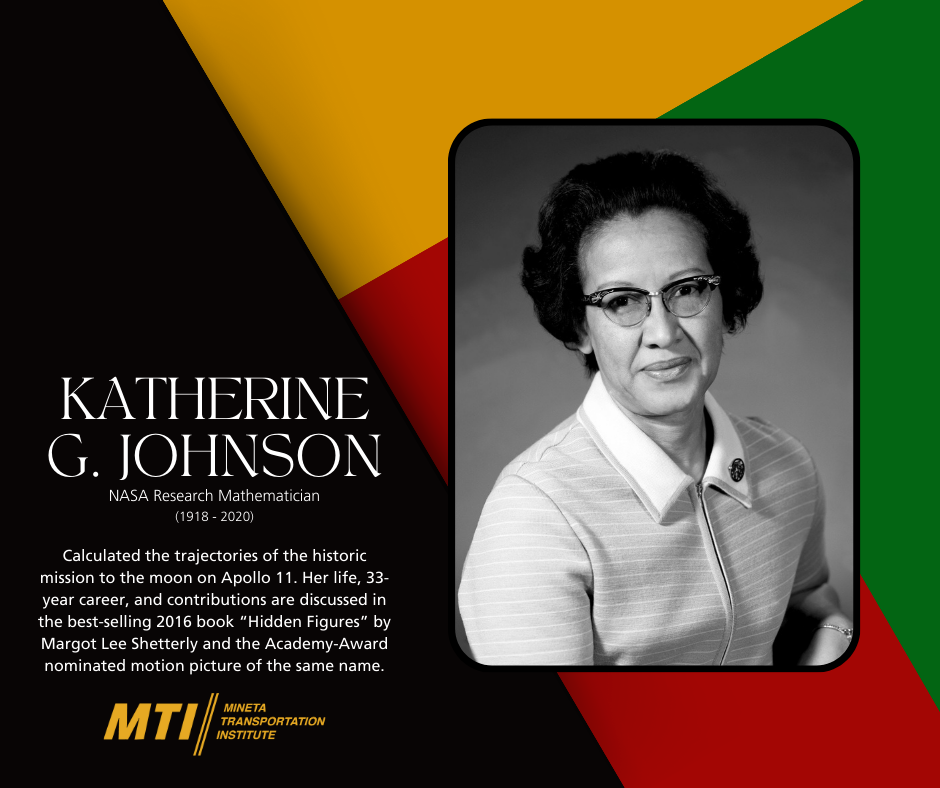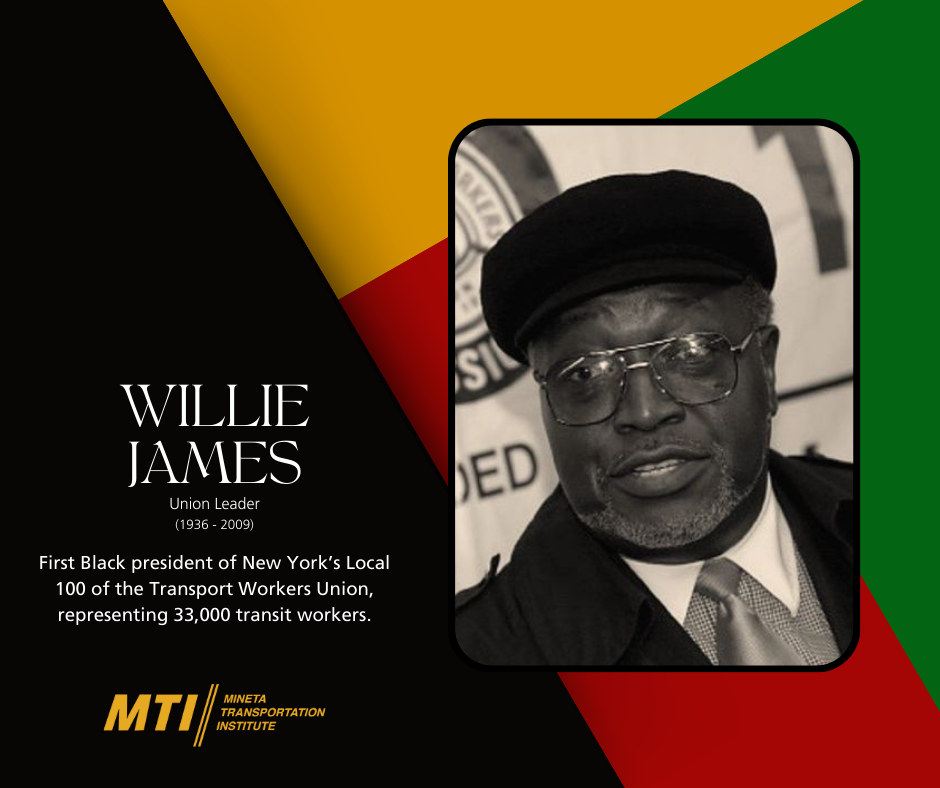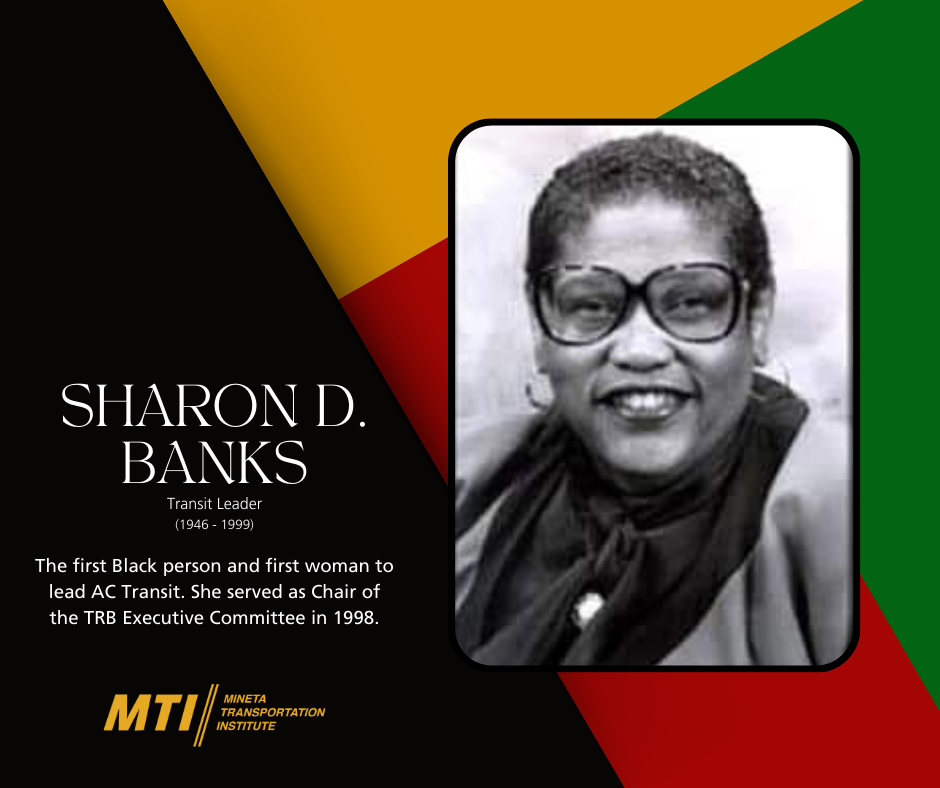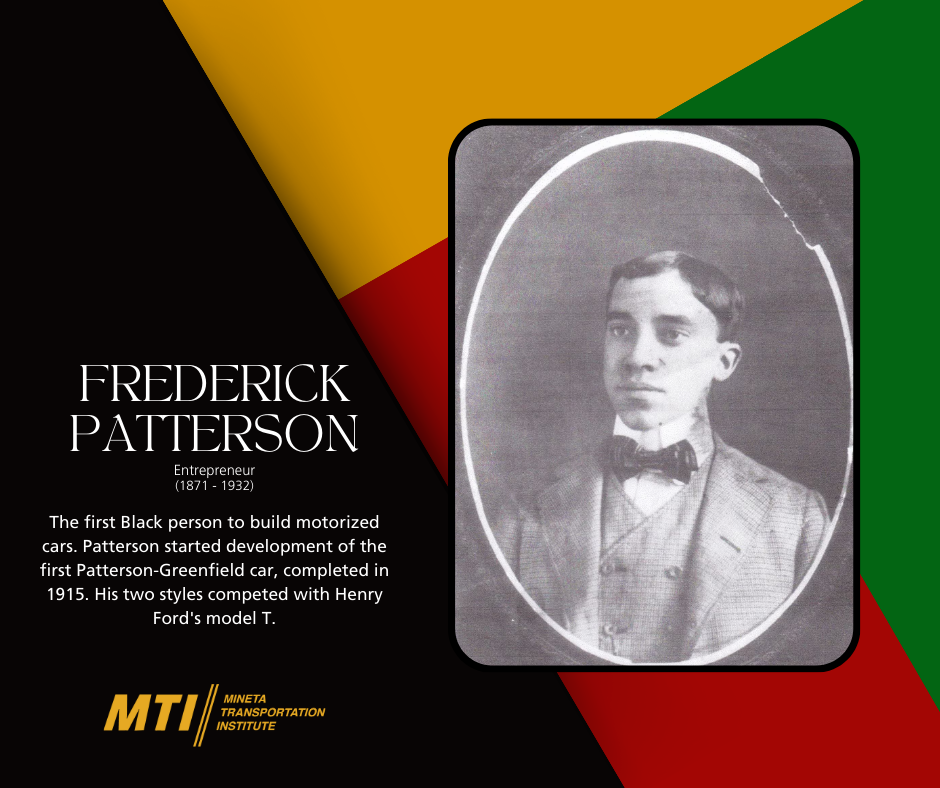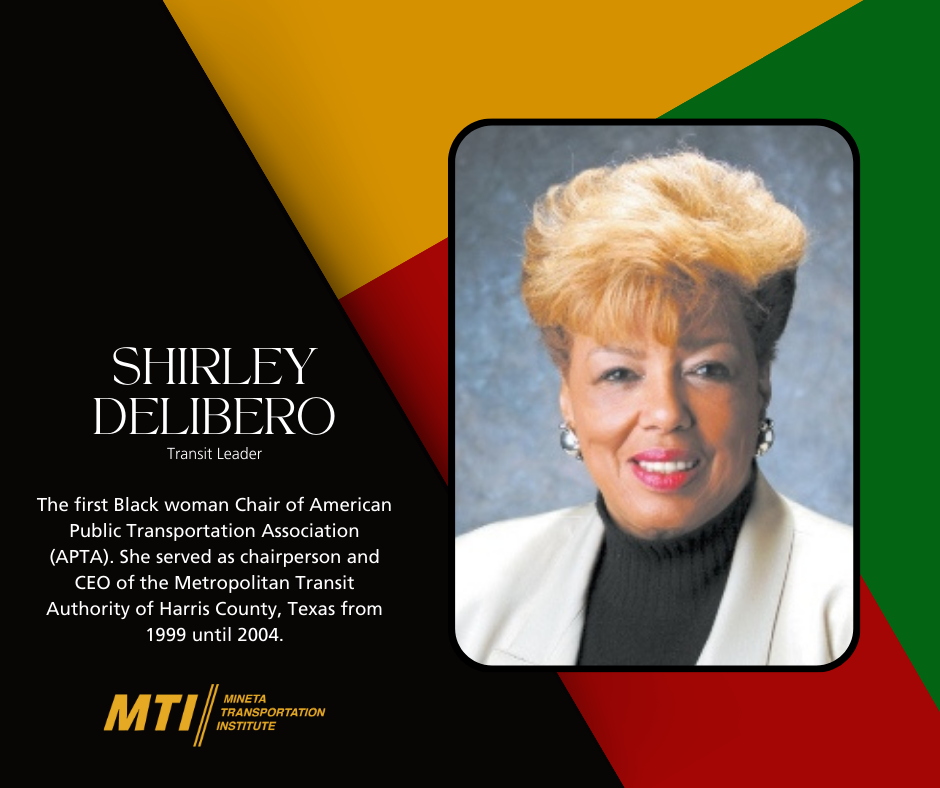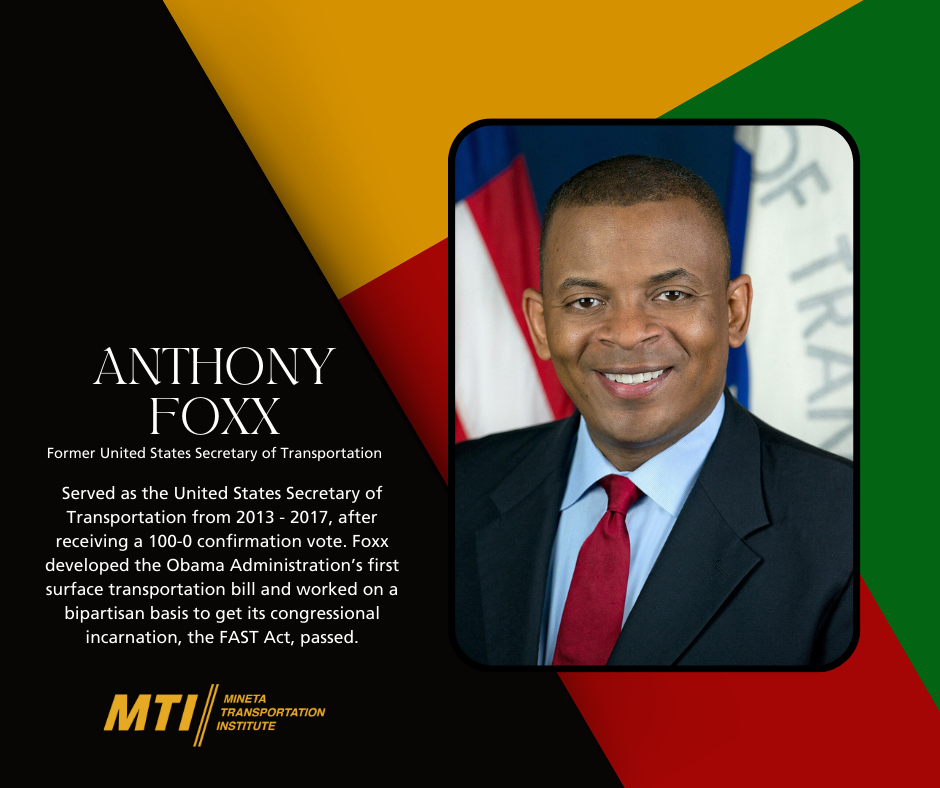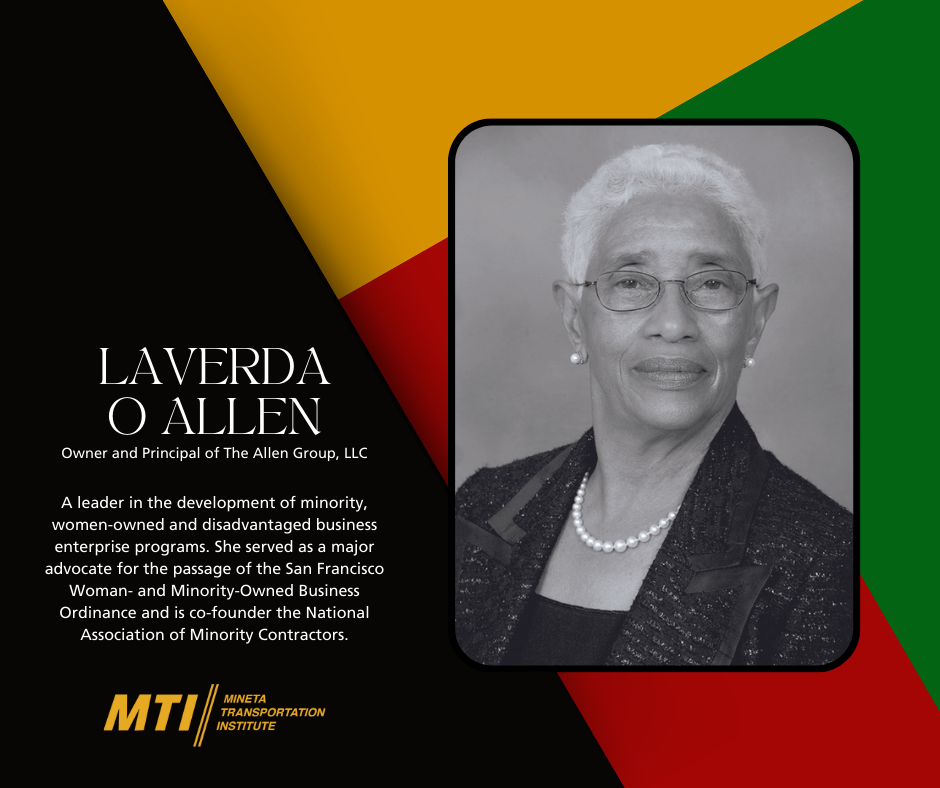- 408-924-7560
- mineta-institute@sjsu.edu
- Donate
MTI Celebrates Black History Month (February 2024)
February is #BlackHistoryMonth, and MTI is celebrating with a series highlighting the many achievements of African American and Black transportation experts and trailblazers.
From traffic signals to NASA, transportation has long been shaped by the knowledge, skills, and steadfast hard work of individuals like Garrett Morgan, Katherine G. Johnson, Willie James, Sharon D. Banks, and other outstanding Black Americans.
Since 1976, Black History Month has been celebrated in the U.S., and other countries have since created similar celebrations. Celebrating the achievements of Black individuals is an important part of understanding the past and present impacts of transportation infrastructure on communities of color and to celebrate the significant and critical diversity of the transportation industry in our nation and the people it serves. Join us to celebrate Black history and the impacts of just a few individuals—past and present—on shaping transportation to be safer, more equitable, more accessible, and more innovative.
|
|
Garret MorganOur first #trailblazer is Garrett Augustus Morgan, an American inventor, businessman, and community leader. After witnessing a fatal crash, Garrett Morgan invented a three-position traffic signal, the predecessor of the modern-day traffic light. Although “stop” and “go” signals existed, Morgan’s invention also included a third position that stopped traffic in both directions and allowed pedestrians to cross streets more safely. At MTI, we host the annual Garrett Morgan Sustainable Transportation Competition that captures his innovative and relentless spirit. In this competition, middle school teams from across the country learn about the exciting world of transportation with an emphasis in STEAM while competing for a $1000 grand prize for their school. To learn more about the competition, visit https://transweb.sjsu.edu/workforce-development/garrett-morgan-program |
|
|
Katherine G. JohnsonIn celebration of Black History Month, MTI recognizes the pivotal roles of African American women in transportation from the past to the present, including pioneers like Katherine G. Johnson. As one of the first Black women to work as a NASA scientist, Johnson joined an all-male flight research team on which her computations influenced every major space program, including Project Mercury and Apollo 11. At age 97, she was awarded the Presidential Medal of Freedom, America's highest civilian honor, by President Obama. During the awarding ceremony, President Obama proclaimed, "Katherine G. Johnson refused to be limited by society's expectations of her gender and race while expanding the boundaries of humanity's reach."
|
|
|
Willie JamesWillie James was the first African American president of the 30,000-member Transport Workers Union. He led the Union from 1996 to 2000 after spending many years working as a bus operator. Many saw him as a pioneer as he oversaw the advancement of minorities through the ranks even before being elected president.
|
|
|
Sharon D. BanksToday, we celebrate #BlackHistoryMonth by looking back at Sharon D. Banks, a leader in public transportation. As the first black and first female leading AC Transit she directed the agency's $200 million operating budget and supervised its 2,000 transit workers. She also served as Chairwoman of the California Transit Association and Transportation Research Board's Executive Committee, where she improved both California and national transit.
|
|
|
Frederick D. PattersonAt the turn of the 20th century, hundreds of new automobile manufacturing companies began popping up as the transportation norm began shifting from horse-drawn carriage to internal combustion engine vehicles. The nation’s first African-American owned auto company was founded by Frederick Douglass Patterson, who took over and transformed the family’s carriage-building company after his father’s death. His company—centered in Greenfield, Ohio—competed with some of the early auto manufacturers still around today, such as Ford. Named after his father, the company C.R. Patterson & Sons was active from 1893 to 1939. When World War II began affecting manufacturing in the U.S., instead of adapting cars for military use, Patterson targeted students who needed transportation as rural schools were consolidating. The company saw great success, even after Patterson’s death when it was transformed into the Greenfield Bus Body Company, but eventually was forced to shut down, along with many other businesses, due to the Great Depression. Frederick D. Patterson is remembered today as a transportation trailblazer and entrepreneur who contributed to the industry for nearly seventy years.
|
|
|
Shirley DeLiberoShirley DeLibero’s 30+ years of experience in the transportation industry has led to a long list of accomplishments, and we’re celebrating just a few of them today for #BlackHistoryMonth. During her career, Shirley DeLibero has led transit agencies in Massachusetts, Washington D.C., New Jersey, and Texas. She served as Chair of the American Public Transportation Association (APTA), Chair of the Conference of Minority Transportation Officials (COMTO), and has been recognized in the APTA Hall of fame, by the COMTO Distinguished Leadership and Lifetime Achievement Awards, as a Top 10 Women in Government by Good Housekeeping, a Topic Public Official by Governing Magazine, and more. An exceptional leader in so many regards, Shirley DeLibero has had immeasurable impacts on transit and transportation progress!
|
|
|
Anthony FoxxBorn in Charlotte, North Carolina, American lawyer and politician Anthony Foxx is also a transportation expert we’re celebrating this #BlackHistoryMonth. He served as the United States Secretary of Transportation from 2013 to 2017 under President Obama. As Charlotte’s second African-American mayor and its youngest, he invested in transportation and neighborhood improvement projects that often bridged public and private sectors and uplifted and connected communities. He later joined rideshare company Lyft in 2018 as chief policy officer and later advisor. With his help, Lyft became the first rideshare company to commit to 100% EVs by 2030 and launched the LyftUp program, which helps underserved communities get access to work and healthy foods through free rides.
|
|
|
LaVerda O. AllenLaVerda O. Allen founded The Allen Group, LLC. in 1989 with the guiding belief that small local, minority-owned businesses can deliver quality and value on any project equal to the largest firms in the engineering-construction industry. Quickly earning a reputation for excellence, The Allen Group now provides a wide range of project and construction management services for civil infrastructure projects nationwide. Before she founded The Allen Group, she worked as an industry consultant to disadvantaged, minority, and woman-owned businesses. LaVerda Allen has also served as an advocate for uplifting marginalized voices in construction and transportation, including pushing for the passage of the San Francisco Woman- and Minority-Owned Business Ordinance, and co-founding the National Association of Minority Contractors.
|
-
Contact Us
San José State University One Washington Square, San Jose, CA 95192 Phone: 408-924-7560 Email: mineta-institute@sjsu.edu

